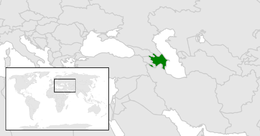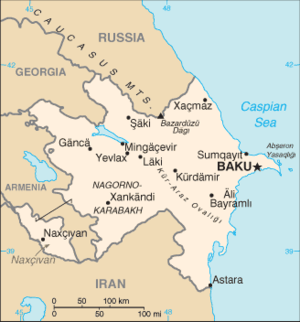Karabakh oilfield
| Karabakh | |
|---|---|
 | |
| Country | Azerbaijan |
| Offshore/onshore | Offshore |
| Operator | Caspian International Petroleum Company |
| Partners | LUKAgip(45%), Pennzoil (30%), Lukoil (12.5%), Agip (5%), SOCAR (7.5%) |
| Field history | |
| Discovery | 1965 |
| Production | |
| Estimated oil in place | 620 million barrels (~8.5×107 t) |
| Estimated gas in place | 5×109 m3 (180×109 cu ft) |
Karabakh (Azerbaijani: Qarabağ) is an offshore oil and gas field in the Caspian Sea, located 130 km (81 mi) east of Baku, Azerbaijan, in the northern part of Absheron archipelago.[1] The Karabakh block is located 15 km (9.3 mi) northeast of another big field - Azeri-Chirag-Guneshli (ACG) [2]
History
A production sharing agreement (PSA) for exploration and development of the Karabakh field was signed on 10 November 1995. It is considered to be Azerbaijan's second major contract for development of oil fields in the Caspian Sea after ACG project. The agreement had a development and production period of up to 25 years with possible extension of 5 more years[2] On 13 February, 1996 the agreement was ratified by the Parliament of Azerbaijan Republic. The contract came into force on 28 February 1996. On 4 June 1996, the companies holding an interest in the project established a joint consortium and named it Caspian International Petroleum Company (CIPCO).[3] CIPCO officially started operating in August 1996. On 26 January 1999, CIPCO announced it would cease its operations. According to the management of the consortium, the development of the field was not economically profitable at this stage. As per the president of the consortium, James Tilley, the drilling of 3 wells indicates the reservoir holds no more than 30 million tonnes of oil. CIPCO officially completed its operations on 23 February 1999. Total expenses incurred constituted nearly $100 million.[1][4] In April, 2006, SOCAR announced it would be able to develop the field itself without foreign investment. Total expenditures would reach close to $200 million. According to the Vice-President of SOCAR, Khoshbakht Yusifzade, the feasibility study of two of the drilled wells revealed availability of 10 million tonnes of oil and 5-6 billion cubic meters of natural gas which draws a clear picture on recoverable reserves as a whole.[5]
Ownership
Shareholders of CIPCO have the following stakes in Karabakh field:
| Company | Interest |
|---|---|
| LUKAgip JV | 45% |
| Pennzoil | 30% |
| LUKOIL | 12.5% |
| SOCAR | 7.5% |
| Agip | 5% |
According to the PSA agreement, the total bonus to be paid to Azerbaijan would have been $135 million. Total capital expenditures for the project were to be $1.7 billion[1] $1.3 billion was planned for operating costs.[2]
Production
According to preliminary data, an estimated 620 million barrels (~8.5×107 t)[2] of oil is believed to lay in the field. Depth of the strata is 3,300–4,200 metres (10,800–13,800 ft). The agreement between the parties stipulated a 3 year feasibility study (seismic study and drilling of 3 wells). The period could have been extended if necessary. First production was planned for end of 2000. The drilling activities were conducted by US-Azerbaijan joint venture Caspian Drilling Company established by SOCAR and Santa Fe[1]
See also
- Azeri-Chirag-Guneshli
- Baku–Tbilisi–Ceyhan pipeline
- Sangachal Terminal
- South Caucasus Pipeline
- Baku-Supsa pipeline
- Baku–Novorossiysk pipeline
- Nabucco pipeline
- Baku-Novo Filya gas pipeline
- Nakhichevan field
References
- 1 2 3 4 НЕФТЕГАЗОДОБЫЧА В СТРАНАХ СНГ
- 1 2 3 4 "Karabakh. 2nd Major Oil Contract". Azerbaijan International. Spring 1996. Retrieved 2009-12-08.
- ↑ "Karabakh. 2nd Major Oil Contract". Azerbaijan International. Autumn 1996. Retrieved 2009-12-08.
- ↑ "Projects". SOCAR. Retrieved 2009-12-08.
- ↑ "ГНКАР планирует вложить до $200 млн. в разработку нового месторождения в Каспийском море". Kazakhstan Today. 2006-04-29. Retrieved 2009-12-08.
